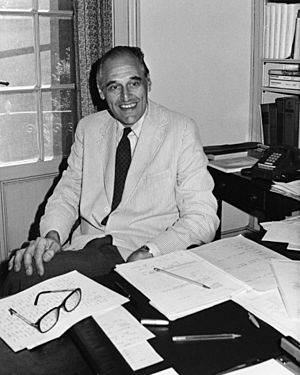Giles Constable facts for kids
Quick facts for kids
Giles Constable
|
|
|---|---|
 |
|
| Born | 1 June 1929 London, England
|
| Died | 17 January 2021 (aged 91) |
| Nationality | British |
| Alma mater | Harvard University |
| Scientific career | |
| Institutions | Institute for Advanced Study |
| Notable students | John Boswell |
Giles Constable (born June 1, 1929 – died January 17, 2021) was a famous historian. He spent his life studying the Middle Ages, a time period from about 500 AD to 1500 AD. Giles Constable was especially interested in the religion and culture of the 11th and 12th centuries. He often focused on the Cluny Abbey, a very important monastery in France, and its leader, Peter the Venerable.
Contents
Early Life and Education
Giles Constable was born in London, England. His father, William George Constable, was an art historian. Giles went to Harvard University in the United States. He earned his first degree there in 1950. Later, he completed his Ph.D. at the same university in 1957.
A Career in History
Giles Constable taught history at several well-known universities. From 1955 to 1958, he taught at the University of Iowa. After that, he moved to Harvard University, where he taught from 1958 to 1984. At Harvard, he became a special professor of Medieval History.
From 1977 to 1984, he was the Director of the Dumbarton Oaks Research Library. This is a research center that focuses on Byzantine studies. In 1985, he joined the Institute for Advanced Study. This is a famous place where smart people can do research without teaching classes. He became a professor there and later a professor emeritus in 2003. This means he retired but kept his title.
Exploring Medieval Times
Giles Constable was very active in exploring the history of religion and ideas from the Middle Ages. He wrote or edited more than twenty books on these topics. His most important works looked at the religious and cultural history of the 12th century.
He wrote about many interesting subjects, such as:
- The beginnings of church taxes paid by monasteries.
- The life and influence of Peter the Venerable.
- The people and power of Byzantium, an ancient empire.
- Ideas about religion and society in the Middle Ages.
- Changes and reforms that happened in the 12th century.
- The history of the Crusades, which were religious wars.
- The history of the important Cluny Abbey.
Giles Constable passed away in Princeton, New Jersey, when he was 91 years old.
Honors and Memberships
Giles Constable was a member of many important groups. These groups recognized his great work in history. Some of them include:
- The Medieval Academy of America
- The American Historical Association
- The American Philosophical Society
- The British Academy
He was also a member of several academies in Europe, like the Académie des Inscriptions et Belles-Lettres in France and the Bavarian Academy of Sciences in Germany. Being a member of these groups showed how respected he was around the world for his knowledge of history.
 | Frances Mary Albrier |
 | Whitney Young |
 | Muhammad Ali |

